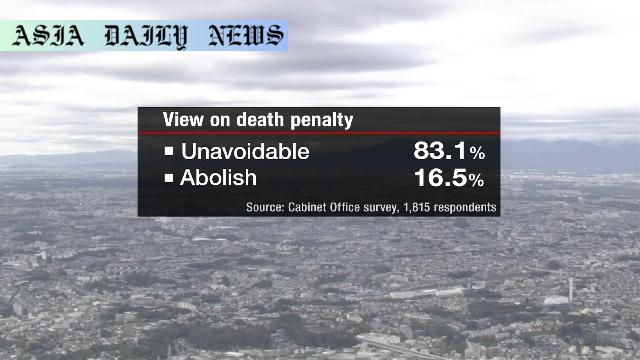Death Penalty: Over 80% of Japanese respondents believe that capital punishment for heinous crimes is ‘unavoidable.’

Introduction: A Deep Look into Japan’s Public Opinion
The results of a recent survey conducted by Japan’s Cabinet Office reveal that a staggering 83.1% of the population believe the death penalty is ‘unavoidable’ for certain crimes. This survey, which encompassed 3,000 individuals aged 18 and above, captured a response rate of 60.5% and sheds light on prevailing sentiments regarding justice, victims’ families, and societal safety.
The Study and Key Findings
The survey asked respondents to choose between supporting or abolishing capital punishment. Of those surveyed, 16.5% supported abolition, leaving over 80% favoring its retention. Among supporters, the predominant reason (62.2%) was the belief that the death penalty provides peace of mind to victims and their families. An additional 55.5% argued that heinous crimes merit retribution in the form of the perpetrator’s life.
In contrast, those advocating for abolition highlighted critical issues such as the inability to undo wrongful executions (71%) and the opportunity for offenders to atone while in incarceration (53.3%). Despite these concerns, the overwhelming majority seem swayed by arguments for justice and deterrence.
Crime Deterrence: A Divisive Issue
Another aspect of the poll delved into whether respondents believed abolishing the death penalty would lead to an increase in heinous crimes. A striking 71.2% agreed with this notion, indicating a strong perception that capital punishment acts as a crime deterrent. On the other hand, 27.7% felt crime rates would remain unaffected. This dichotomy highlights the deeply rooted fears regarding public safety in the absence of the harshest punishment available.
Repercussions of Abolition: Ethical and Practical Concerns
Opponents of the death penalty, though fewer in number, strongly presented their ethical concerns. Many noted the irreversibility of execution in cases of judicial errors, aligning with broader global concerns about fairness and justice. Additionally, there’s an emerging preference to rehabilitate criminals, allowing them to reflect and repent for their misdeeds, which contrasts sharply with the punitive stance of its proponents.
Global Context and Japan’s Unique Position
Globally, the death penalty remains a contentious issue. While several countries have moved toward abolition, Japan stands alongside nations like the United States and China in defending capital punishment. The cultural and legal frameworks of Japan often tie justice to retribution, reflecting public sentiment strongly favoring victims’ rights and societal security.
This global context makes Japan’s continued use of capital punishment noteworthy. The stark contrast between abolitionist nations and Japan’s punitive justice system draws attention to the country’s unique stance, influenced by its societal values and historical perspectives.
Conclusion: A Complex Debate
The findings from the Cabinet Office survey underline Japan’s complex relationship with the death penalty. While the majority of citizens support its retention, citing concerns for victims and deterrence, a vocal minority underscores ethical dilemmas and risks of irreparable mistakes. This issue remains a deeply polarizing one, reflecting broader questions about justice, ethics, and the role of punishment in society. As Japan navigates this debate, its decision will serve as a litmus test for balancing public opinion with evolving standards of human rights and criminal justice.
Commentary
A Personal Perspective on the Survey Results
The results of Japan’s survey regarding the death penalty are both thought-provoking and concerning. The overwhelming support for capital punishment emphasizes the society’s prioritization of justice, retribution, and public safety. Still, it raises significant ethical and moral questions that cannot be overlooked. How do we reconcile the overwhelming need for victims and their families to find peace with the irreversible nature of taking a life?
Victim-Centric Arguments Carry Weight
One cannot ignore the sentiment that many respondents expressed regarding victims. In a society as tightly knit and community-oriented as Japan’s, it’s understood why justice for victims and their families holds an essential place. However, is it possible that there are alternative ways to ensure closure and peace without resorting to capital punishment? This remains a critical question for policymakers and citizens alike.
The Risks of Irreversible Errors
On the other side of the coin, abolitionists make compelling arguments about the risks of wrongful executions. The possibility of judicial error is a powerful deterrent against capital punishment. If even one innocent life is lost, it undermines the entire justice system. This sobering truth is why many nations have abolished the death penalty entirely, leaning towards life imprisonment as a safer, though imperfect, solution.
A Call for Nuanced Discussion
Ultimately, Japan’s retention of the death penalty underscores deeper societal values and fears. Yet, the debate must move beyond binary arguments and delve into a nuanced discussion surrounding ethics, victims’ rights, and judicial reliability. Perhaps, in exploring alternative approaches to justice, Japan can find a balance between supporting victims and maintaining a fair, humane legal system. Regardless of one’s stance, the conversation surrounding the death penalty is vital and must continue.


